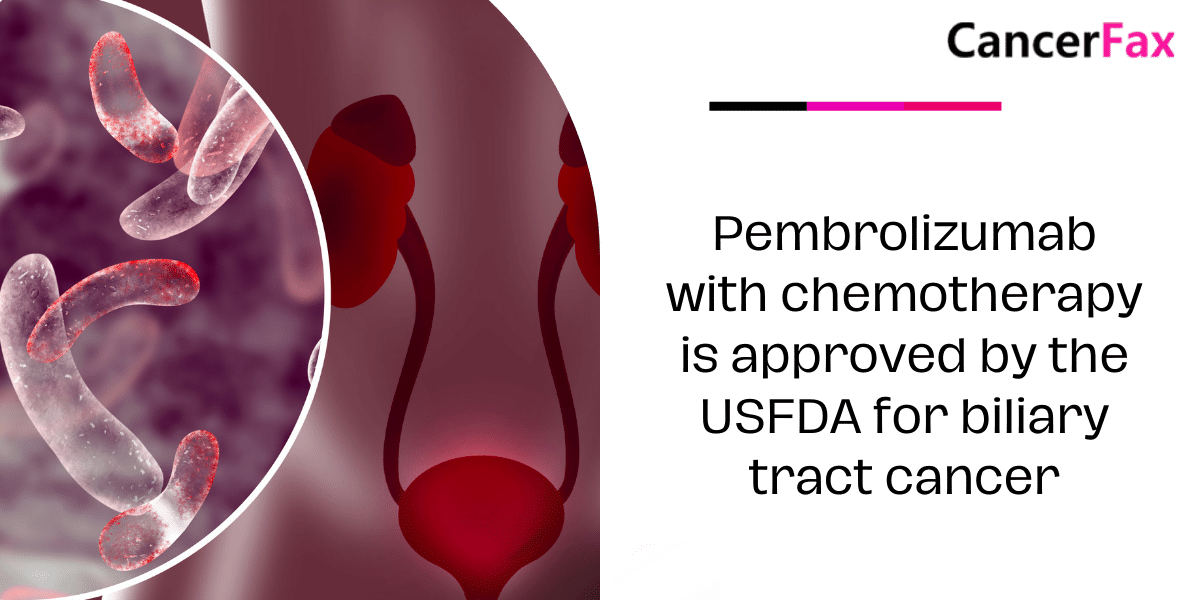On October 31, 2023, the Food and Drug Administration approved pembrolizumab (Keytruda, Merck) to be used with gemcitabine and cisplatin to treat biliary tract carcinoma (BTC) that has spread or is locally advanced but can not be removed.
The effectiveness was assessed in a study called KEYNOTE-966 (NCT04003636), which was a multicenter, randomized, double-blind, placebo-controlled trial involving 1069 patients with locally advanced unresectable or metastatic BTC who had not undergone previous systemic therapy for advanced illness. Patients were randomly assigned to receive either pembrolizumab in combination with gemcitabine and cisplatin every 3 weeks, or placebo in combination with gemcitabine and cisplatin on the same schedule. Treatment persisted until intolerable side effects or advancement of the disease. Cisplatin was given for up to 8 cycles, whereas gemcitabine was continued based on the physician’s judgment. The administration of Pembrolizumab or placebo was maintained until illness progression, intolerable toxicity, or a maximum duration of 2 years.
The primary effectiveness endpoint was overall survival (OS). Pembrolizumab combined with chemotherapy showed a substantial increase in overall survival compared to placebo combined with chemotherapy, with a hazard ratio of 0.83 (95% CI: 0.72, 0.95); one-sided p-value=0.0034. The median overall survival (OS) was 12.7 months with a 95% confidence interval (CI) of 11.5 to 13.6 in one group, and 10.9 months with a 95% CI of 9.9 to 11.6 in the other group.
Interruption of pembrolizumab due to adverse events happened in 55% of patients. Low neutrophil count, low platelet count, anemia, low white blood cell count, fever, tiredness, cholangitis, elevated ALT and AST, and biliary obstruction were some of the side effects or lab problems that happened so often (≥2%) that the treatment had to be stopped.
The suggested dosage of pembrolizumab is 200 mg every 3 weeks or 400 mg every 6 weeks until disease progression or intolerable toxicity. Administer pembrolizumab before chemotherapy if both are given on the same day.

Targeting FGFR4 and CD276 with CAR T-cells demonstrates a strong antitumor impact against children rhabdomyosarcoma
Chimeric antigen receptor (CAR) T-cells that specifically target Fibroblast Growth Factor Receptor 4 (FGFR4), a surface tyrosine receptor that is extensively expressed in rhabdomyosarcoma (RMS), are now undergoing clinical research. However, the effectiveness of these CAR T-cells may be hindered by tumor heterogeneity and inadequate activation. In this study, we present a method to enhance the co-stimulatory and targeting characteristics of a FGFR4 CAR through an optimization process. We substituted the hinge and transmembrane domain of CD8 as well as the 4-1BB co-stimulatory domain with the corresponding domains of CD28. The CARs produced exhibit heightened anti-tumor efficacy in multiple RMS xenograft models, with the exception of the RMS559 cell line, which is known for its aggressive nature.

